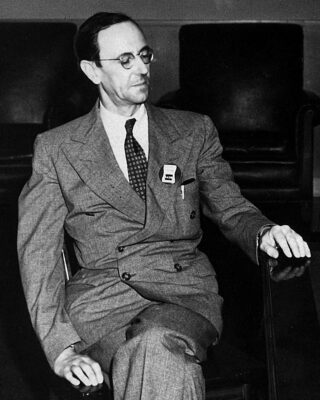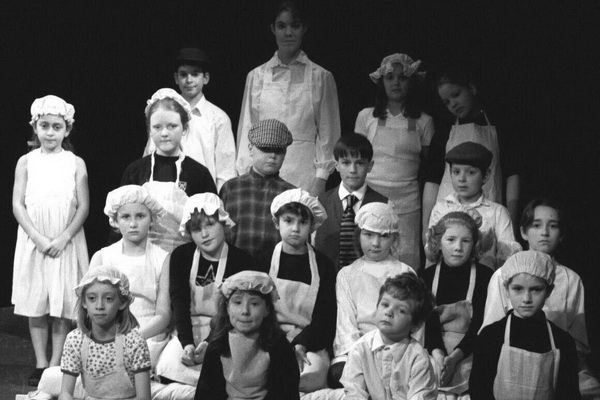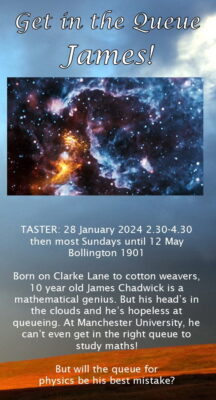
Bollington Festival Music Theatre came within a few days of performing a play about the childhood of Dr Samuel Johnson alongside young folk musicians from his home city Lichfield. But a fortnight before the performance, for reasons everyone will remember, we rehearsed for the last time until September 2021. Since then, members have enjoyed a variety of projects, but Get in the Queue, James! will be their first performance open to the public. It was to have been part of the 2024 Bollington Festival, but with that postponed until 2026, is going ahead regardless.

James Chadwick was born in a weaver’s cottage on Clarke Lane in 1891. He attended Bollington Cross School and his brilliance at maths won him a scholarship to Manchester Grammar School, though the high fees meant he attended a new and aspiring free grammar school near Piccadilly Station. Aged just sixteen he won a place at Manchester University, but being in the wrong queue meant he found himself on the physics course, and was too shy to protest. The rest is history: he was the man who discovered one component of the atom – the neutron – that led directly to the development of the atomic bomb when the Allies and the Nazis were in a desperate race that victory depended on. The bomb has only been used once – by the USA on two Japanese cities in 1945. Despite their terrifying power, it could be argued that the deterrent of mutually assured destruction has kept the world safer.
What is certain is that without Chadwick’s discovery, and local hero Alan Turing cracking the Enigma Code that enabled the RAF and its allies to destroy Nazi heavy water plants, Hitler may have dominated the world. Like much in science, Chadwick’s discovery had benign applications too – especially in treatments for cancer.
James’ own memories of childhood at the turn of the 19th and 20th centuries were hazy when he was interviewed by a US journalist as an old man. His father had several jobs including on Bollington’s railway and running a laundry in Manchester. At one point the boy lived with his grandmother. He remembered being severely caned for skiving off primary school – with the headmaster’s son – to go bird nesting. He remembered a particularly inspiring teacher at the free Manchester school. And he remembered the day when aged 16 – far too young in his opinion – that teacher could no longer stretch him, and he enrolled on the wrong course at the city’s university to study physics rather than maths. This vagueness gave Donald Judge, aided by ideas from the cast, to develop an almost entirely fictitious account of James’ early life, where he gets in the wrong queues for all sorts of things, from the girls’ queue when starting school… Sent by his mum to queue at Barrow’s Butchers, for lamb from the legendary Derby Ram, he gets first in a queue for skipping and then for Smith’s Bakery. When Queen Victoria visits Macclesfield in 1897, her golden jubilee year (she never did!) he gets in the VIP queue for tea and cake with Her Majesty, before getting in a queue to do Morris Dancing… And on his first day at Grammar School, he gets on the train going in the wrong direction…
Thus, the script abounds in local references and humour. The twelve strong cast of 8-11 year olds play all the characters, including three boys who are James in different scenes. The story is told through dialogue, narrations and songs. Some are original ones with words and music by director Donald Judge. Others are folk songs like The Derby Ram, the hymn All things bright and beautiful, and the Morris Dance tune Jubilee, still used by Adlington Morris Men.
As well as piano accompaniment, Fran Wilkie will play the violin, and some of the cast percussion. The longest song tells the story of young children working in mills in the 1830s before universal education and the gradual raising of the school leaving age. There are regular repeats of the song Get in the Queue, James! – a catchy boogie woogie number. The final song asks: The atom, the atom. Who understands the atom?
Thanks to the generosity of Bollington Arts Centre, admission is free but donations will be welcome by cash or bank transfer, with details on the day. While audience can turn up on the door, those coming are asked to email bfmt@bollingtonartscentre.co.uk with numbers so that seats can be allocated alongside those for the cast’s family.
The images show BFMT members as Victorian child mill workers in Millennium Dreams (2000) and as Pirates in Buccaneers of the Bolling (2019), both photos © Donald Judge. The image of James Chadwick is Public Domain from Picryl. The remaining image is a screen shot from BFMT’s Brochure for 2023-24.
bfmt@bollingtonartscentre.co.





